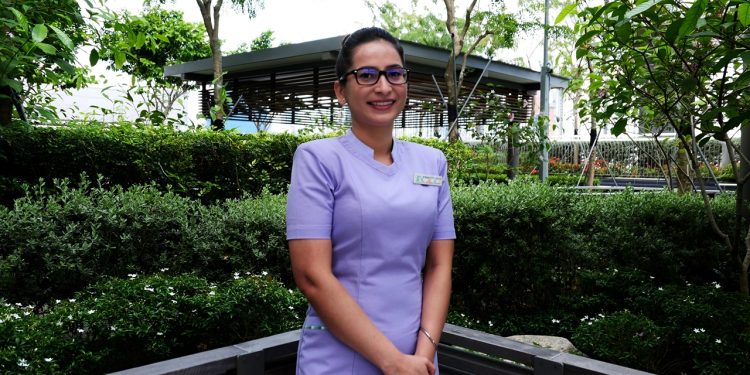Most of the time when we talk about lifelong learning, we associate it as a concern of mature workers, who need to upskill or reskill to stay relevant in the ever-changing employment landscape.
But upskilling does not have to wait till the fear of redundancy sets in. For 33-year-old Kiranjeet Kaur, she has never put the brakes on her quest to improve herself since the day she first came to Singapore 11 years ago.
She has shown that we should embark on our lifelong learning journey early, acclimatising and nurturing our mindsets to constantly pick up new skills, and not get complacent with training.
LabourBeat caught up with the Senior Care Support Associate (CSA) from the Singapore General Hospital (SGH) Renal Cohort, to find out more about her healthcare journey, as well as her hopes for the future.
Q: When and why did you decide to join the healthcare sector?
I wanted to do something in my career that is challenging, interesting and makes a difference in peoples’ lives. Healthcare is interesting because it involves saving lives, and it brings happiness to individuals and their families.
After I first graduated from India, my aunt who was here in Singapore advised me to get my start in the healthcare industry as an administrator. So yeah, that’s where my journey started.
When I first came in 2011, I did a nine-month WSQ (Singapore Workforce Skills Qualifications) course. Then in 2012, I officially became a Patient Service Associate (PSA).
There is such a high demand for workers in the healthcare industry. There are so many opportunities for career advancement, and there is job stability too.
I am happy to be part of this.
Q: Tell me more about your role as a PSA.
PSA is an administrative job. Usually, we handle admissions. When patients come to the ward, we orientate the patients, we bring the patients to their beds and we also orientate the patient’s relatives as well.
We handle the discharges and the transfers in the bed management system. Through the bed management system, we can locate the transfers, accept the admissions, and put up the discharges. We also obtain the appointments for the patient upon their discharge.
We [lastly] send the charge forms of the patients’ procedures or anything we know the nurses used, to the business office. And then we check the census, making sure the census tallies with the patients.
It is mostly “counter work”, not “patient work”.
Q: And now as a CSA?
As CSA, we are taking care of the patient.
We assist the patient with their basic needs and attend to their calls. CSA is more like nursing care – we help check the [patient’s] parameters, draw blood, the ECG (electrocardiogram) and wound dressing.
If patients want to go for a shower, we assist with the showering and sponging. If the patient has to go for any procedure, such as dialysis, then we will assist to send the patients over.
Q: So how is being a CSA different from being a nurse?
CSAs provide basic care to patients. We also assist and help the nurses.
Q: How did you make the transition from PSA to CSA? Was it something you volunteered for?
When I was in the ward doing the PSA job, I saw the nurses doing the nursing care, and how they cared for the patient. It was then that I felt like I also want to become a nurse.
One day, I got the opportunity when my sister [a term used for a senior nurse at SGH] told me that there was a course for a CSA and asked me if I was willing to go. So I said yes to my sister.
Q: I understand that you became a CSA in 2019, and a Senior CSA in 2020. Were there any changes to your job after your promotion?
Senior CSAs have an upgraded skillset. We are taught to do blood taking, cannulation and setting up of oxygen therapy.
These are all taught to the Senior Care Support Associate. Care Support Associates are only able to help with basic care.
Q: So on the whole, you are happier with your role now?
I feel more confident than before.
Previously I just handle only counter work, just attend the calls only or the patients’ relatives. But now I can interact with the patients and take care of them. So I feel more confident. I feel it is, more fulfilling and I feel more satisfied.
Q: What are your plans moving forward?
I have plans to become a nurse. So for that, I have applied for further studies next year, with the organisation helping to sponsor my studies.
It will be a two-year, full-time nursing course.
Q: Do you have any advice to give anyone interested in taking the route
There are many opportunities for career advancement in healthcare. There is job security as well, so I think it is a good industry to join.
And I find that when you do nursing care, it is more fulfilling and it is more satisfying.

